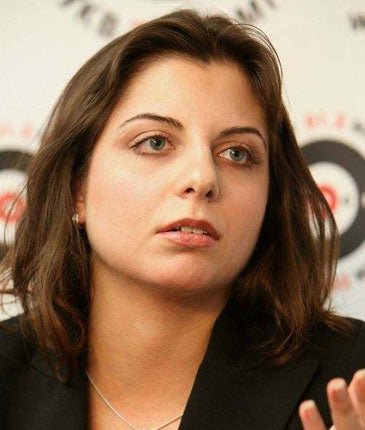Young, fearless and feisty – the new face of Russian TV news
Freed of the shackles of Soviet-style journalism, RT is trying to transform Russia's tarnished global image, reports Ian Burrell

Your support helps us to tell the story
From reproductive rights to climate change to Big Tech, The Independent is on the ground when the story is developing. Whether it's investigating the financials of Elon Musk's pro-Trump PAC or producing our latest documentary, 'The A Word', which shines a light on the American women fighting for reproductive rights, we know how important it is to parse out the facts from the messaging.
At such a critical moment in US history, we need reporters on the ground. Your donation allows us to keep sending journalists to speak to both sides of the story.
The Independent is trusted by Americans across the entire political spectrum. And unlike many other quality news outlets, we choose not to lock Americans out of our reporting and analysis with paywalls. We believe quality journalism should be available to everyone, paid for by those who can afford it.
Your support makes all the difference.Margarita Simonyan, relaxed in a leather jacket and jeans, is at just 29 the editor-in-chief of RT, the Russian global television news service in English that competes with BBC World News and CNN. What's more she's an old hand, having been in the job for four years.
"That's not unusual in Russia, although it's weird for the West," she says. "There's a huge generational gap between the Soviet-school journalists and the new journalists. We were not brought up working on propaganda, we were brought up in the new Russia, working on the news. When the Soviet Union collapsed the television businesses found it was easier to hire 16 or 18 year-olds and teach them everything from the beginning rather than re-teach the old school folk."
Simonyan began her television career at 18. She has a friend who was appointed New York correspondent of the major Russian TV station Rossiya at the age of 22, and another who was put in charge of the main Russian-language 24-hour news service when 25.
There are many things that might be considered "weird" in Britain that are normal in Russia, says Simonyan, which is why RT – which is broadcast on Freeview and Sky – has a role to play in building understanding. "Russia has never been very good at explaining itself to foreigners."
She is trying to change that with the output of RT (previously Russia Today) which is owned by the Russian state news agency RIA Novosti and exists to "let the world hear a Russian point of view". The state "doesn't at all" interfere with editorial content, she says, and with RT's funding allocated by the Duma "it doesn't come right from the Kremlin into our pockets".
Feistily, she suggests that the Foreign Office would find little to complain about in the output of BBC World News. "Not a single story on BBC World News is any different from the British foreign policy". RT goes out of its way to pursue different stories to the BBC and CNN.
So RT covered the mass protests in Georgia that preceded by a year the Russian invasion of 2008. "There were tens of thousands of people gathered around the parliament. They were roughly dispersed with tear gas, rubber bullets and sound machines." She says the story was at that stage ignored by other global broadcasters.
The channel has a growing presence in North America and recently chose to highlight the predicament of a US female soldier who had fled to Canada rather than serve in Iraq.
But RT has so far struggled to find an audience in Britain, despite having as its star newscaster the former Sky News presenter Kevin Owen, who last year won the Russian equivalent of an Emmy for his work. RT has hired advertising agency McCann Erickson to help raise the channel's profile.
Interest in Britain should be all the greater for the presence of so many powerful Russians in British society. RT has a four-strong London bureau led by British journalist Laura Emmett. Alexander Lebedev, the billionaire owner of the London Evening Standard has given the network a series of interviews. More controversial are some of the Russian business figures living in exile in Britain. Such as Yevgeny Chichvarkin, Boris Berezovsky (pictured) and the Chechen leader Ahmed Zakhaev. Simonyan is closely following the case of Chichvarkin, who is wanted in Russia for kidnap.
She admits Russia is seen abroad "much worse than I would like it to be" and that "like every country in transition" it has "real problems", such as "the corruption that's pandemic on all levels" and the consequences of the government's economic failings. People who watch RT regularly, she asserts, will see that it is not afraid to broadcast stories challenging Dmitry Medvedev's regime.
Another issue in Russia is the murder of journalists, such as the campaigning reporter Anna Politkovskaya who was assassinated in the lift of her apartment block in Moscow in 2006. Simonyan says this is not a new issue. In 1995 Vlad Listyev, a popular newscaster on Russian television, was shot dead on the stairs of his apartment building in a hit that has never been solved. "People didn't stop being journalists or making brave reports," she says, explaining why she is not afraid to continue reporting. "I always know that there might be a threat but if you think of that then you should really change your profession."
Join our commenting forum
Join thought-provoking conversations, follow other Independent readers and see their replies
Comments